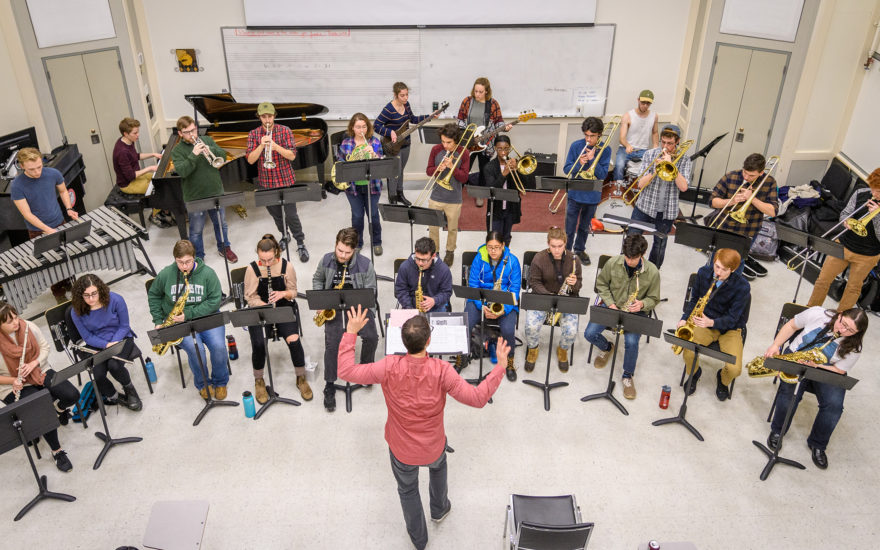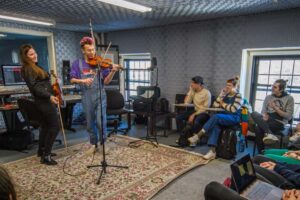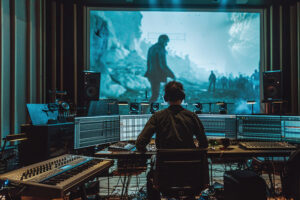Let’s take it from the top
Whatever has ignited your passion for music, you can stoke that fire as a music major in any of four tracks of study: performance, composition and theory, history and criticism, and technology.


Why study music at Clark?
- Hone your musicianship in Estabrook Hall’s rehearsal space, recording studio, and practice rooms — or take to the stage in the Traina Center for the Arts’ Razzo Hall.
- Perform as a member of Clark’s many vocal and instrumental ensembles, including chamber music ensembles, Clark Concert Choir and Chamber Chorus, Jazz Workshop, Concert Band, and the Sinfonia string ensemble.
- Work closely with renowned faculty mentors who can guide and support your practice.
- Explore music’s potential to advance social causes, and use your talents to generate political action and social justice — whether by serving at-risk youth in Worcester, or volunteering with a local arts organization.
- Apply
- Request Info
Are you ready to take the first step?
Featured Courses

Improvisation and Aleatory
Whether you’re a composer, music producer, or performer, exposure to the theory and practice of improvisation, aleatory (random choice techniques), and open-form music can help you take your work to the next level.

Community Music and Social Action
Explore how music professionals and other artists can support and generate social change. You’ll work with at-risk youths in a free, local music program, and/or intern with a prominent local arts organization.

Soundtracks
Experience how sounds and music work with (and against) moving images while you explore elements of narrative sound and audiovisual analysis, postproduction techniques, and historical sound and music conventions.
As you begin to study music at Clark, you’ll take foundational courses that begin to build the intellectual and critical tools you’ll need for advanced work in music performance, theory, history, and technology. As you complete foundational courses, you’ll put your knowledge into action through workshops and seminars, and learn the intellectual, practical, and personal skills that are the hallmark of Clark’s LEEP model of education. In workshop courses, you’ll build “communities of practice” by bringing your developing proficiencies and interests to bear on challenging project-based tasks that require collaboration and integration of skills. For example, in MUSC 225: Jazz and Popular Music Composition and Performance, faculty mentors work with students as composers, performers, critics, and audio engineers to create new compositions from concept to recording.
Career Communities are industry-focused groups designed to support your professional exploration and narrow down your career interests within specific fields. You’ll connect to opportunities, professionals, and information that will support your career development. The following communities may be of interest:
Government, International Affairs, and Law
Non-Profit, Human Services, and Education
Double-Majors and Minors: Clark Visual and Performing Arts Department (V&PA) majors are a motivated, tight-knit group. In fact, many music majors often double-major or complete a minor in another V&PA discipline (art history; media, culture and the arts; screen studies; studio art; or theatre arts), each of which has its own distinct curriculum — and faculty who encourage collaborative work.
Elementary, secondary, and college teaching; private instruction
Professional singer, musician or composer
Producer/Recording Engineer
The Music Place
Marketing, Sales/Special Events
Central Massachusetts Convention and Visitors Bureau
Production Manager
AS220, Providence, R.I.
- New York University; Ph.D. in composition
- The Boston Conservatory; M.A. in education
- California Institute of the Arts; M.A. in music composition
- University of New Hampshire; M.A. in music history
- The Boston Conservatory; M.A. in vocal performance and pedagogy
The Clark Experience
The Clark Experience brings together the exceptional education you’ll receive in the classroom and so much more. Through focus and flexibility, it ensures you’ll leave Clark with the creativity, confidence, and resilience to succeed and lead a life of meaning and consequence.
Frequently Asked Questions
What can I do with a major in music?
At Clark you’ll get more than a great education; you’ll also be prepared for a long, productive career and life of consequence. And once you’ve completed your degree, you can join other Clark alumni who have gone on to work for great organizations and attend some of the best graduate schools in the world.
What skills will I learn?
- Music theory — the study of the practices and possibilities of music
- Critical thinking and analysis — music composition and music history
- Collaboration — performance and academic workshops and group projects
- Technical skills — audio engineering/sound synthesis studio
- Leadership — performance groups, academic workshops, and group projects
What facilities, rehearsal, and performance spaces are available?
As a music student, you’ll spend a lot of time in the Traina Center for the Arts, which features a recital hall, multimedia center, and resource library, and in Estabrook Hall, which includes rehearsal space, practice rooms, and a recording studio.
Are there academic achievement awards for music majors?
Robert P. Manero Memorial Music Award
The Robert P. Manero Memorial Music Award was established in 1987 by the Clark University music program in honor of lecturer Robert P. Manero. The awards are given to outstanding seniors in the Visual and Performing Arts Department music program.
Robert. P. Manero Prize for Musical Scholarship
This prize recognizes an outstanding scholarly work written by a Clark undergraduate that addresses music. Any scholarly project that explores music from a historical and/or critical perspective is eligible for consideration. This work may take any form, typically an academic paper written for a course or seminar, but other formats, including electronic publications, are eligible. Possible approaches include music analysis, music history, musicology, cultural studies, music cognition, music in politics, or music as social text. The submissions will be judged on the basis of their depth of research, critical and historical acuity, strength of documentation, and clarity of thought and presentation.
Robert P. Manero Prize for for Musical Creativity
This prize recognizes an outstanding creative project involving music created by a Clark undergraduate. This work may take any form, typically a notated musical composition, a recorded project, an electro-acoustic composition, a multi-media project with a substantial musical component, or a recital performance. The submissions will be judged on the basis of their music quality, the level of technical skill, creativity, and clarity of conception and presentation.
Patricia M. Plamondon Undergraduate Award in Visual and Performing Arts
The Patricia M. Plamondon Award is given to juniors and seniors who have demonstrated their talent in and commitment to the arts and for whom the award will serve to enhance their studies, research, or project-related travel. The award is made annually by a vote of the full-time faculty of the Department of Visual and Performing Arts.
Is there an honors program in music?
During your junior year, you might be accepted into the music honors program. Joining the program means you’ll work closely with a professor to create a thesis or project on a topic of your choice. Examples of recent honors topics are:
- Thesis: “Just Like ‘Clockwork:’ An Analysis of the Symbolism of Beethoven’s Ninth Symphony in Anthony Burgess’s and Stanley Kubrick’s A Clockwork Orange”
- Composition: “Craven angels” for String Quartet; premiered: Razzo Hall, Clark University, QX String
Be a force for change.
Come study at a small research university with a strong liberal arts core.

